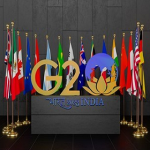India’s year-long G20 presidency crossed its midpoint on May 31. Six months are over, and the latter half unfolds now, with attention focused on the summit in Delhi on September 9-10. This is an apt moment to present a dispassionate evaluation of the presidency’s past performance and prospects.
The Indian presidency could not have avoided the effect of the pandemic, economic slowdown and sharpening geopolitical contestation. Added to this mix was the growing polarisation triggered by the Ukraine conflict, which exposed the vulnerability of the G20. The group is divided while battling serious challenges. Hence, the G20 president’s task has become more complex today.
This backdrop underlines that the nation has done well in leveraging the presidency as an instrument to secure its vital goals. First, as a responsible and major player in the international arena, India has not only identified and articulated the current challenges but also led in forging solutions. Around 120 meetings of G20 mechanisms held so far were primarily about this task. The coming months will witness discussions at the ministerial level, and eventually at the leaders’ level.
Second, the objective has been to project the nation’s rich cultural heritage, diversity and achievements of its development-with-democracy model to demonstrate the fruits of political stability, strong leadership and inclusive economic progress. The calculation is that this will help India in strengthening its tourism, trade, technology and investment-related links with the world. Third, a more complex motivation has been to assert New Delhi’s leadership role on the world stage, showing India as a nation that is comfortable in dealing with the West (despite differences), maintains ties with Russia and even China (despite continuing tensions with the latter) and is keen to serve as the advocate of the Global South. To execute this tightrope-walk through deft diplomacy, a blend of agility, imagination and luck is essential.
The Indian media has accorded extensive coverage to G20-related developments, including discussions at government and non-government levels. In the process, the public stands well informed.
But the real challenge will be to wrangle with different actors at the September summit. It is advisable to use a three-pronged yardstick to assess fairly the outcome of the Delhi Summit: consensus, additionality and implementability.
First, will the Indian hosts be able to craft a single consensus document – the Delhi Declaration – at the summit’s conclusion? Or the result will be more like the March meeting of G20 foreign ministers, where Russia and China refused to go along with the remaining 18 members on the paragraphs relating to Ukraine? Besides, there is uncertainty about the presence in Delhi of all G20 leaders, and it may have increased further by Shanghai Cooperation Organisation’s inability to hold the summit in Delhi with the physical presence of its leaders.
Second, additionality refers to the contents of the Delhi Declaration. Will they be more substantive, even new, when compared to the Bali Declaration of the previous summit, particularly those relating to global solutions? Finally, the implementability of the main agreements, imbued with the political will to execute consensus-based decisions alone, will show if G20 is an effective global directorate or a mere talk shop.
The Delhi Summit may also indicate if G20, clamouring for reform in multilateral economic institutions, is capable of reforming itself. If so, it should have little hesitation in admitting the African Union (AU) as its newest member. Whether it also calls for accelerating the expansion and democratisation of the UN Security Council will be watched with considerable interest.
Among the presidency’s priorities, two are certain to register progress. On climate and energy transition finance, G20’s commitment could be specific and reflect additionality. In stressing the global relevance of India’s Digital Public Goods (DPG), the government has shown exceptional activism. A strong formulation in the final declaration seems certain. But the authorities would do well to work on the presidency’s eight guest nations such as Bangladesh, Egypt and Mauritius through bilateral discussions to secure their cooperation in this domain.
In a democratic spirit, the views of critics and dissenters should be noted. A former senior official recently posited that the world is “perilously close” to a global conflict and advised that “high expectations” of a rich dividend from G20 and SCO summits must be toned down. A veteran Opposition leader spoke of the “G20 hypocrisy” arguing that the official rhetoric about democracy and diversity were not in consonance with domestic policies. A third critic wrote about the hijacking of G20’s civil society forum. Some foreign observers complained about the Think20 process.
In the multi-faceted caravan that India’s G20 presidency is, a few irritants are par for the course. Objectively speaking, the presidency has performed quite well so far, particularly in creating an unprecedented buzz across the land about India’s role in the world. With a continuation of diligence, diplomatic nimbleness, political vision, and some more luck, the caravan should reach its destination successfully, bringing greater glory to India and G20.
Ambassador Rajiv Bhatia is Distinguished Fellow, Foreign Policy Studies, Gateway House and a former ambassador.
This article was first published in Hindustan Times.


